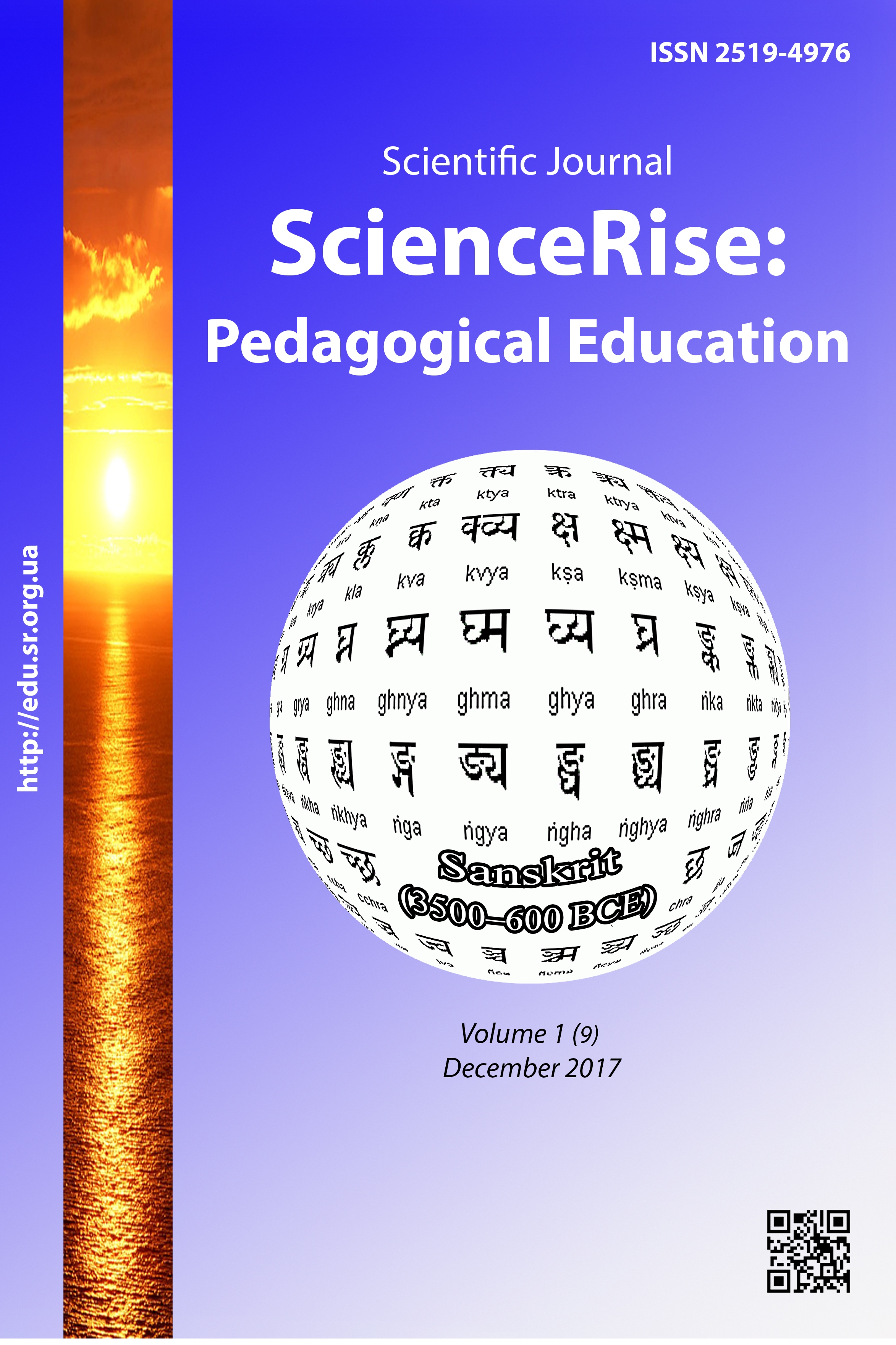The features of problem-based method in teaching foreign grammar to tertiary students
DOI:
https://doi.org/10.15587/2519-4984.2017.90902Keywords:
group/independent work, explicit knowledge, heuristic talk, problem-based methodAbstract
The article deals with the problem of teaching foreign grammar and features of formation of foreign grammar competence in higher educational institutions according to the modern needs and changes. In correspondence with linguistic and psychological studies, the guarantee of quality and proper level of foreign communicative competence under conditions of artificial bilingualism is a formation of explicit grammar knowledge and increase of role of active cognitive activity and independence of students. Thus, at teaching grammar of foreign languages it is important to favor the formation of student’s ability to generalize information independently and form conclusions as to the use of grammar structures. The problem-based method effectively solves the question of conscious students’ approach to the mastering of foreign language and independent collection of knowledge. In teaching foreign grammar with the help of problem-based approach, the great recognition and use were gotten by the methods of group work, consideration of preliminary experience (linguistic and learning) and also heuristic talks. The important achievement of group work is a distribution of responsibility for the results and successes of study between teacher and student, first of all, at the expanse of formation of self-control skill that allows students regulate the own studying activity. Heuristic talk motivates students to independent formulation of new knowledge or ways of their obtaining, opens the way and logic of search. Based on preliminary experience of studying the native language, student pays attention to the different methods of work with linguistic (grammar) material and to the strategies of mastering the foreign language. So, the study of foreign grammar using the problem-based method form the skills of cognitive, scientific work that favor the conscious and independent mastering of knowledge, develop cognitive activity and critical thinking of students, form the skills of independent work. The skills of independent work, in their turn, allow student control the process of studying foreign language effectively and are the one of most effective means of successful influence on learning processReferences
- Corder, S.; Rutherford, W., Sharwood, M. (Eds.) (1988). Pedagogic Grammar. Grammar and second language teaching. New York: Harper & Row Publishers, 123–145.
- Swan, M. (2006). Teaching grammar – does grammar teaching work. Modern english teacher, 15 (2). Available at: http://www.mikeswan.co.uk/elt-applied-linguistics/teaching-grammar.htm
- Widodo, H. P. (2006). Approaches and procedures for teaching grammar. English Teaching Practice and Critique, 5 (1), 122–124. Available at: https://education.waikato.ac.nz/research/files/etpc/2006v5n1nar1.pdf
- Noonan, E. (2004). Testing ESL students to “Notice” Grammar. The Internet TESL Journal, 10 (7). Available at: http://iteslj.org/Techniques/Noonan-Noticing.html
- Passov, Ye. I. (1991). Kommunikativnyi metod obucheniya inostrannomu govoreniyu [Communicative approach to teaching foreign language speaking]. Moscow: Prosvescheniye, 223.
- Zabavnikov, B. N. (1984). Teoreticheskiye osnovy kommunikativno-opuyentirovanoi grammatiki [Fundumentals of functional grammar]. Samara: Izd-vo Samarskogo un-ta, 160.
- Brown, H. (2000). Principles of language learning and teaching. Vol. 4. New York: Addison-Wesley Longman, 352.
- Passov, Ye. I. (1980). Opredelyeniye ponyatiya “Kommunikativnyi metod” [Analysis of the communicative approach concept]. Problems of communicative approach in foregn language teaching, 280, 26–39.
- Volovik, A. B. (1985). Kommunikativnyi podchod k obucheniyu inostrannomu yazyku v metodicheskich sistemach Velikobritaniyi i SSHA [Communicative approach to foreign language teaching in Great Britain and the USA]. Foreign language methods in tertiary school, 257, 14–28.
- Cook, V. (2001). Using the First Language in the Classroom. Canadian Modern Language Review, 57 (3), 402–423. doi: 10.3138/cmlr.57.3.402
- Vygotskii, L. S. (1936). Izbrannyye psichologicheskiye isledovaniya [Selected psychological studies]. Moscow: Akademija pedagogicheskih nauk RSFSR, 319.
- Thornbury, S., Underhill, A. (2001). Uncovering grammar. Oxford: Macmillan Heimann English Language Teaching, 122.
- Kavaliauskiene, G. (2009). Role of mother tongue in learning English for specific purposes. ESP World, 8 (1 (22)). Available at: http://www.esp-world.info/Articles_22/PDF/ROLE%20OF%20MOTHER%20TONGUE%20IN%20LEARNING%20ENGLISH%20FOR%20SPECIFIC%20PURPOSES.pdf
- Little, D. Learner autonomy and second/foreign language learning. Centre for Languages, Linguistics and Area Studies. Available at: https://www.llas.ac.uk/resources/gpg/1409
- Chamot, A. U., Keatley, C., Meloni, C. F., Gonglewski, M., Bartoshesk, A. Developing Autonomy in Language Learners. Learning Strategies Instruction in Higher Education. National Capital Language Resource Center. Available at: http://www.nclrc.org/guides/HED/pdfs/cover.pdf
- Sklyarenko, N. K. (2008). Prinsiples of foreign communicative competence formation. Language, culture, education in modern world. Kyiv: Center KNLU, 237–242.
- Dooly, M. (2008). Telecollaborative Language Learning. Bern: Peter Lang, 21–45.
- Slobodchikov, V. A. (Ed.) (1986). Kontrol v obuchenii inostrannym yazykam v srednyei shkole [Assessment in foreign languages teaching in secondary school]. Moscow: Prosvescheniye, 110.
- Shatilov, S. F. (1986). Metodica obucheniya nemetskomu yazyku v srednyei schkole [Methods of teaching German in secondary school]. Moscow: Prosvescheniye, 223.
Downloads
Published
How to Cite
Issue
Section
License
Copyright (c) 2017 Вікторія Василівна Осідак

This work is licensed under a Creative Commons Attribution 4.0 International License.
Our journal abides by the Creative Commons CC BY copyright rights and permissions for open access journals.
Authors, who are published in this journal, agree to the following conditions:
1. The authors reserve the right to authorship of the work and pass the first publication right of this work to the journal under the terms of a Creative Commons CC BY, which allows others to freely distribute the published research with the obligatory reference to the authors of the original work and the first publication of the work in this journal.
2. The authors have the right to conclude separate supplement agreements that relate to non-exclusive work distribution in the form in which it has been published by the journal (for example, to upload the work to the online storage of the journal or publish it as part of a monograph), provided that the reference to the first publication of the work in this journal is included.








